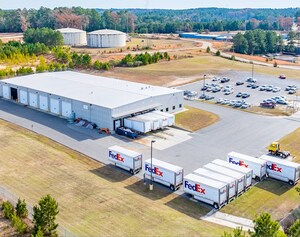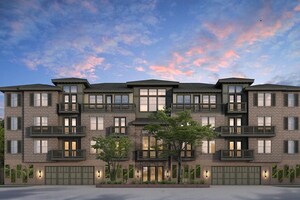Why Now Might be a Good Time to Consider Multi-Tenant Retail Properties for 1031 Exchange DST Investments
LOS ANGELES, March 28, 2024 /PRNewswire/ -- Cove Capital Investments reviews and analyzes nearly every type of asset class available for Delaware Statutory Trust investors. This list of potential DST property asset classes includes government leased buildings, self-storage facilities, multifamily apartments, medical buildings, fast food buildings, pharmacies, distribution facilities, shopping centers and more.
However, Cove Capital Investments believes that within today's business and capital markets landscape, interest rate environment, and macroeconomic trends, there is an asset class with opportunistic potential that is being overlooked by many investors: multi-tenant retail.
Make sure to watch this video of Dwight Kay explaining exactly why Cove Capital Investments believes there is opportunistic value for investors in multi-tenant retail DST properties.
What is the Multi-Tenant Retail Asset Class?
Before we get into why we believe that multi-tenant retail could be a good investment for DST 1031 investors, let's first review just what is a multi-tenant retail property.
Multi-tenant retail as a real estate asset class refers to commercial properties that have multiple retail tenants within a single complex. In essence, it's a type of retail property where there are several distinct retail spaces leased out to various businesses under one ownership or management structure. These spaces can range from small centers with just a few independent tenants to large retail centers from where numerous national retail brands operate.
Potential Advantages of Investing in the Multi-Tenant Retail Asset Class:
- Diversified Income Stream Potential*:
One of the primary advantages of investing in multi-tenant retail properties is the potential for a diversified income stream. With multiple tenants, the investor is not solely relying on the success of a single business or tenant. Even if one tenant experiences a downturn, the income from other tenants can potentially help offset the impact.
* Diversification does not guarantee protection from losses or guarantee returns. - Reduced Catastrophic Vacancy and Lease Expiration Event Risk:
Multi-tenant retail properties generally have lower catastrophic vacancy and lease expiration event risk compared to single-tenant properties. If one tenant leaves, the remaining tenants continue to generate income potential while a new tenant is sought. This reduces the impact of vacancies and lease expirations on cash flow potential and allows for a smoother transition. In a single-tenant property if the tenant leaves, become insolvent/bankrupt or "goes dark", 100% of the income potential and rent is impacted creating a potentially catastrophic event. - Increased Tenant Stability Potential:
The presence of multiple tenants can provide greater stability possibilities to the property. Established retail centers often attract reputable tenants with longer term leases, which reduces potential risk. Additionally, the synergy created by having complementary businesses operating in proximity can enhance customer foot traffic and increase the likelihood of tenant retention prospects. - Potential for Higher Returns*:
Multi-tenant retail properties can offer attractive potential cash flows on investment. With multiple possible income sources and staggered lease expirations, investors can generate the potential for income and appreciation over time. Well-located and well-managed retail centers can experience consistent demand, leading to the possibility of increased property values and rental rates.
* Returns are never guaranteed in DST 1031 properties and other types of real estate investments. Please read the full Private Placement Memorandum to understand the risks of investing in a DST investment. - Meaningful Income Potential:
Oftentimes when Cove Capital is analyzing multi-tenant retail assets we are seeing acquisition cap rates that are meaningfully higher than single tenant net lease properties. This translates into a higher potential cash on cash return for our investors in a multi tenant retail DST as compared to a single tenant net lease DST offering.
* Cash flow and distributions are never guaranteed in any type of real estate investment. Please read the full Private Placement Memorandum for a discussion of the business plan and risk factors.
The 20-Year Odyssey of Multi-Tenant Retail Assets
Like Odysseus, the hero in Homer's famous epic poem, multi-tenant retail properties have been through quite a journey over the past 20 years. From a real estate investment perspective, multi-tenant retail properties reached their peak during the mid to late 2000s. Back then, investors had easy access to credit, low interest rates, and upbeat economic forecasts. Investors flocked to multi-tenant retail properties because they offered diversified income streams from multiple tenants, potentially reducing risk compared to single-tenant properties. Additionally, retail space was in high demand due to consumer spending trends and the perceived stability of the retail industry. This demand and perceived security in multi-tenant retail assets continued to drive up the pricing of these assets and drive down initial going in cap rates.
Today, in retrospect, it is clear to see these assets were overpriced and just didn't make sense from a per square foot basis and the super low cap rates they were delivering. Still, many investors entered these investments using high leverage, balloon mortgages and with a belief the multi-tenant asset class would continue to appreciate.
When COVID-19 hit in 2020, the retail and restaurant industries were upended, and many stores went out of business. On top of this, the online shopping trend kicked into high gear, as consumers quickly figured out that ordering online was easier and more convenient than visiting their local mall or retail center.
As a result, the multi-tenant asset class continues to experience some distress, and investors continue to shy away from it creating compelling acquisition opportunities for capable real estate operators.
Cove Capital Investment's Thesis on Why Now Could be An Opportune Time to Invest in Multi-Tenant Retail Properties
Warren Buffet, the world-renowned investor once said, "Be fearful when others are greedy and greedy when others are fearful", and we believe this philosophy perfectly reflects the multi-tenant asset class today.
For example, right now investors are afraid of multi-tenant retail assets and are moving aggressively into other asset classes like multifamily and industrial properties where the perceived distress is much less visible.
Because Cove Capital Investments practices contrarian investment strategies and emphasizes capitalizing on opportunistic investment pockets that other professional and institutional investors may overlook, we believe this trend of moving away from multi-tenant retail properties presents a unique opportunity for investors, and to quote Mr. Buffet, "the time to be greedy."
Five Specific Reasons Why Investors Should Consider Multi-Tenant Retail Assets
Reason #1:
High CMBS loan default environment
One of Cove Capital's contrarian investment philosophies is its focus on buying debt-free assets as a specific strategy to help Delaware Statutory Trust 1031 exchange investors mitigate risk. However, many owners of multi-tenant retail properties have purchased these assets 5-10 years ago and have put very high loan-to-value Commercial Mortgage-Backed Securities (CMBS) debt on these assets. In the current rising interest rate environment, assets that were purchased with a 60% or 70% loan-to-value (LTV) are now more like a 85% to 90% LTV. With many of these loans coming due soon, Cove Capital Investments believes there may be opportunity to acquire these assets at discounted prices. Furthermore, it is estimated that approximately $126 billion in commercial debt is coming due next year alone, and over $1 trillion of debt is coming due over the next three years. Many owners are going to have a hard time refinancing these highly leveraged loans with the current interest rate environment.
Cove Capital believes that the current high CMBS loan default environment creates an opportune time to acquire multi-tenant retail centers for its 1031 exchange DST investment platform.
Reason #2:
Distressed Assets abound.
Based on our research, Cove Capital believes that in 2023 alone, there was currently approximately $64 billion of distressed multi-tenant assets in the market. This distress has triggered high foreclosure rates, and mounting pressure on owners facing maturing loans in the very near future. Adding to the situation is the fact that lenders are backing away from lending on retail assets, and many owners have minimal cash reserves for upgrades, deferred maintenance and re-tenanting. As a result, we're seeing a lot of properties with tons of deferred maintenance as landlords have neglected to put money back into these shopping centers. Discontent among tenants is also very common.
Cove Capital believes the level of potential distress within the multi-tenant retail asset class presents a unique investment opportunity for DST investors.
Reason #3:
Poorly Managed Retail Centers
Another trend Cove Capital Investments has noted is that property owners are not keeping leases to current market rates. The main reason for this is that owners are trying to keep tenants in their spaces and can't afford to re-tenant their properties. On a broader level, we are seeing many examples where there is significant deferred maintenance issues with these retail locations.
For example, our acquisitions team is seeing deferred maintenance in the parking lots, roof systems, HVAC systems, building facades and elevations that are old and need to be updated.
We are also seeing examples where property owners are signing gross leases (where the tenant pays a base rent, and the landlord is responsible for covering the remaining property expenses) as opposed to triple net leases (where the tenant pays base rent plus property taxes, insurance, and maintenance) as a way to get potential tenants in the door.
Again, Cove Capital feels there is an opportunity to convert these gross leases into triple net leases and re-tenant should the original tenant vacates.
Reason #4:
Potential Opportunities
When examining the multi-tenant retail asset class as a place for opportunities for its Delaware Statutory Trust program, Cove Capital believes that many opportunities present acquisition prices per square foot that are well below replacement costs. As a result, we feel there is an opportunity in the multi-tenant asset class to potentially grow the NOI of certain properties by taking rents to market rates and leasing those vacancies at current market rates.
Another unique opportunity the Cove Capital's Delaware Statutory Trust acquisition team has noted relates to outparcel pad leasing opportunities. Specifically, in some cases there is an opportunity to create on outparcel pad for a single tenant creating increased NOI potential and its resulting value possibility.
Reason #5:
Cove Capital is an all-cash buyer
Unlike many other Delaware Statutory Trust sponsor firms that utilize leverage when purchasing properties, Cove Capital is an all-cash buyer. This presents a level of comfort to sellers of properties that we have a certainty of closing whereby there is no lender involved in the transaction. Oftentimes, Cove Capital will not be the highest bidder on a property yet we will be awarded the deal by the seller due to the fact that we are all-cash and our reputation of consistently closing on assets throughout the country.
The all-cash nature of Cove Capital's business plan not only protects investors from a loss of principal due to a lender foreclosure (since there is no lender on the property) but it also allows us to negotiate better pricing for our investors on our acquisitions. This is especially important to sellers that have some level of distress and need certainty of closing due to a loan coming due or a situation where they are undercapitalized and don't have the funds necessary to backfill vacant space or extend existing leases.
In Summary
Cove Capital believes there is significant upside potential within the multi-tenant retail sector, and is committed to identifying and acquiring properties where there are believed to be opportunities for growth and value creation.
While each multi-tenant retail property is unique, Cove Capital believes there are multiple opportunities to improve net operating income within the multi-tenant asset class including offering incentives for early lease renewals and strategically converting gross leases to net leases. Couple these strategies with implementing proactive marketing efforts to fill vacant spaces, and capitalizing on out parcel leasing opportunities, and Cove Capital believes it can foster a mutually beneficial relationship with tenants while also maximize return possibilities for its investors and continue to establish itself as a leader of contrarian thinking within the evolving landscape of commercial real estate and sponsoring Delaware Statutory Trust investments for 1031 exchange investors.
About Cove Capital Investments
Cove Capital Investments is a private equity real estate firm and DST sponsor company providing accredited investors access to 1031 exchange eligible Delaware Statutory Trust properties as well as other real estate investment offerings. The Cove Capital team consists of Acquisitions, Asset Management, Accounting, Due Diligence, In-House Counsel, Investor Relations, Marketing and Capital Markets. Cove Capital maintains a robust current inventory of DST and private equity real estate offerings potentially available to investors. Cove Capital Investments has sponsored over 1.9 million square feet of 1031 DST and real estate offerings totaling more than 2.1 million square feet of real estate in the multifamily, net lease, industrial and office sectors. Currently, Cove Capital has more than 1,690 investors.
For further information, please visit www.covecapitalinvestments.com or contact Cove Capital at (877) 899-1315 and via email at [email protected].
SOURCE Cove Capital Investments

WANT YOUR COMPANY'S NEWS FEATURED ON PRNEWSWIRE.COM?
Newsrooms &
Influencers
Digital Media
Outlets
Journalists
Opted In






Share this article